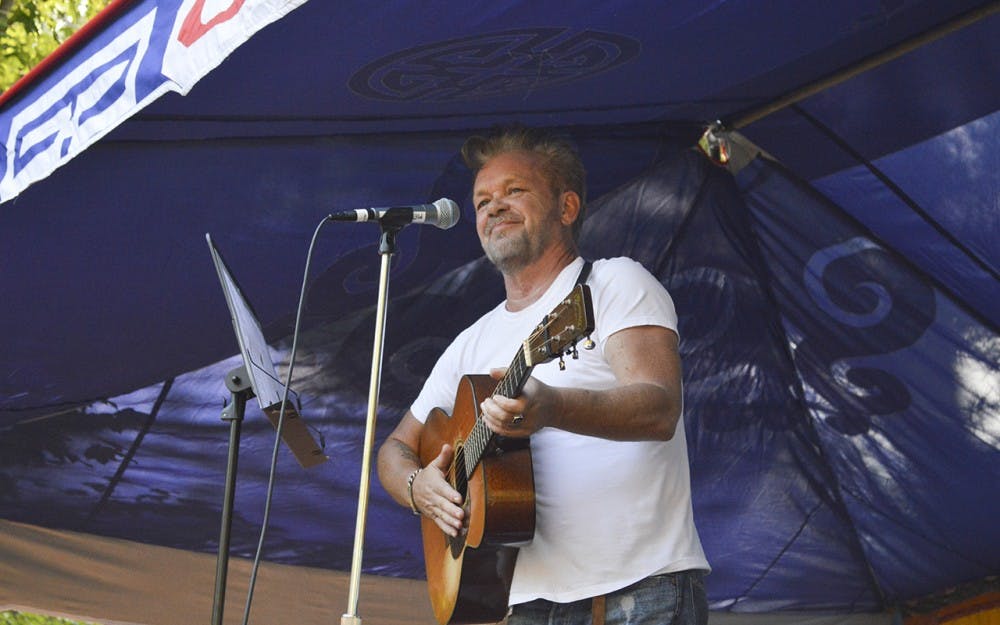While thousands of IU fans celebrated another weekend of home football on Saturday, John Mellencamp played an intimate concert to a crowd of about 100 at the Tibetan Mongolian Buddhist Cultural Center.
His performance was part of the festivities for the two-day celebration at the center. Saturday was a celebration of the 10th anniversary of Arjia Rinpoche assuming directorship of the center, and the events also celebrated Rinpoche’s 66th birthday.
“The center in 2006, when he took over, was going through some serious challenges,” said Chenli Rejie, volunteer and previous manager of the center. “For it to be able to get back on track and get to this level is definitely something for all of us to celebrate.”
Both Saturday and Sunday had a full schedule of festivities. Saturday morning included a ceremony for Rinpoche’s anniversary, followed by live music, a silent auction, a raffle and a sponsors’ dinner.
Sunday was a celebration of Rinpoche’s birthday with prayers, offerings, lunch and cake.
Rinpoche met Mellencamp upon his arrival and placed a white satin scarf around his neck. Rinpoche introduced the guest of honor to those around him, then led Mellencamp back to a large golden tent facing the stage. The two conversed until Mellencamp was called up to perform.
“He knows our director pretty well,” Rejie said. “He has a pretty good relationship with our director.”
Mellencamp’s ex-wife Elaine Irwin serves as the public relations director for the center, according to the center’s website. Mellencamp often visited the center with her, Rejie said.
Mellencamp, dressed in jeans and a white T-shirt, took the stage alone with just an acoustic guitar. He played three songs and told stories about religion, life and death.
His only spiritual upbringing was from his grandmother, a practicing Nazarene, he said. He told stories of visiting her in Seymour, Indiana until her death at age 100. She once told him, “Life is short, even in its longest days.” That quote inspired the song “Longest Days” on his 2008 album “Life, Death, Love and Freedom”, which he played first for Saturday’s crowd.
He followed up with “Save Some Time to Dream” from his 2010 album “No Better Than This.” He ended with his 1982 hit “Jack & Diane.”
The small crowd sat on blankets, mats and lawn chairs facing the stage tent adorned with flags and tassels and surrounded by flowers. The center and the celebration are open to the public, Rejie said.
“It’s kind of mysterious, I get it,” he said. “We’re kind of hidden back here. The gates and everything look a little bit different than other churches, but we’re open to the public, and we really welcome people to come here.”
The center is nestled in a forested area on Snoddy Road, southeast of campus. There is one winding road from the center’s gates through its 108 acres. On Saturday, the road was adorned with colorful banners that led guests into a clearing with the stage, tents and vendors selling artisan gifts and religious tokens.
Although the center was celebrating 10 years of Rinpoche’s directorship, the center has had a place in Bloomington since 1979. It was founded by IU professor Jigme Norbu, the Dalai Lama’s older brother, Rejie said.
The center was established to educate the public about Tibetan religion, culture and heritage. It is also a place for other cultures and religions to join together, Rejie said.
“The big thing is not that just we promote diversity or interfaith, but we value and we try to communicate with other cultures and try to have common dialogue,” he said.
“That’s very important to us because we just want to contribute in a positive way.”






